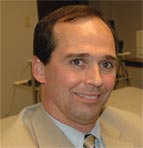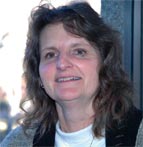University Communications and Marketing
EDUCATION NEXT: A leader in online education in Montana for a decade, MSU positions itself for the future
January 31, 2008
Contacts:
Tim Tirrell, Director of Online Learning Operations, 247-5776
Christy Low, College of Education , 896-5924
Dan Carter, University Relations, 657-2269
By DAN CARTER
MSU Billings News Services
 Like all educators, Tim Tirrell cherishes relationships. But in his world, the ties
that bind are also binary.
Like all educators, Tim Tirrell cherishes relationships. But in his world, the ties
that bind are also binary.
The time-honored relationships between faculty and students are constructed not only in classrooms these days. Unrestricted by bricks, mortar, time or place, they are being built online.
Montana State University Billings has been a leader in the state for online learning since it ventured into the market 10 years ago. Started in 1998 with just five course offerings, the program now stands at around 300 course offerings in three dozen academic disciplines. There are entire programs that are now online and available for students with wide-ranging interests, from an accounting certificate to a master’s degree in communication.
The university’s online offerings last year saw more than 9,000 enrollments and had students from throughout the state, the region and the world. Some of the enrollments included students taking more than one class online, some were students taking classes both at the university and online while others were taking classes through innovative partnerships with other colleges.
“Online education has grown into an important component of our university, both for students and for our faculty,” said Interim Provost George White. “Students appreciate the convenience, but they also understand the academic excellence is at the core of the program because the majority of the classes are taught by our regular faculty.”
To strategically advance the university’s online presence, a specialist has been hired to help with program development and faculty advancement. And that’s where Tirrell steps in.
Tirrell started at MSU Billings in January after working in similar positions on the East Coast. He brings an enthusiasm for higher education with a solid technological understanding. Instead of being a tech geek who wants to see how things fit in higher education, he said, “I’m an academic who knows a lot about technology.”
“Early on, I realized that technology could have a huge impact on education,” said Tirrell, who is originally from New Jersey and spent the last eight years working in higher education in Virginia .
His new job as Director of E-learning Operations at MSU Billings will enable him to combine the best practices of the past with ideas for the future.
“I’ll be able to take all the creative things that have been done, coordinate it and move it in the same direction,” he said. “All the pieces overlap, but it’s been nobody’s job to move it forward.”
Who takes classes online?
Online education has seen continued growth in the past five years, not only at MSU Billings, but nationwide.
From a student’s perspective, it’s all a matter of convenience. If they have family obligations, a job or simply prefer to sleep late, they can log into the MSUB Online in their pajamas at 9 p.m. and do their homework. PowerPoint presentations, recorded lectures and threaded discussions are also just a few clicks away. Of the more than 4,700 credit hours being taken this spring by MSU Billings students, about 900 of them are online-only classes. A growing number of MSU Billings students learn have opted to take classes in conventional classroom format as well as online.
One of those students is Ashlee Young.
A talented and award-winning piano performance major who was invited in December to compete in an international competition in Louisiana , Young spends long hours at the piano keyboard, perfecting pieces by Liszt or Hayden. She also has a dozen students for whom she provides private lessons.
Getting the general education credits she needs during a normal 8-to-5 day is difficult. She has taken math online and this semester is taking basic biology on her computer at home in her free time.
“It works out great,” she said.
National studies show that Young and others like her are part of a growing trend.
According to a Sloan Consortium report issued in December, nearly 20 percent of all U.S. higher education students were taking at least one online course in the fall of 2006. More than 3.5 million students were taking at least one online course, a 9.7 percent increase from the previous year.
For many students, ease of access to the courses and programs they want is important. Adult learners who are seeking professional development or re-entering the higher education system also find online instruction appealing.
Strategies for the future
 Tirrell will be working with MSU Billings faculty member Christy Low in the new venture.
Low, in her second year at MSU Billings, teaches classes on education technology through
the College of Education . She will bring her pedagogical expertise to bear on the
helping others at the university understand how to move forward in online programs
and courses.
Tirrell will be working with MSU Billings faculty member Christy Low in the new venture.
Low, in her second year at MSU Billings, teaches classes on education technology through
the College of Education . She will bring her pedagogical expertise to bear on the
helping others at the university understand how to move forward in online programs
and courses.
Both said the future direction of e-learning depends on the fundamental understanding of today’s typical college student, the young person who can manipulate text messages while listening to conversations. Tirrell said one of the priorities of his job will be coordinating new ways to develop faculty for the next level of e-learning. That way, he said, faculty can be more comfortable with their new students.
“Students we get these days are really into instant messaging and getting information when they want and how they want it,” Tirrell said. “Their phones are not for talking, but for sending messages.”
He said many faculty understand those demographic and technological changes, but they need help understanding how to best apply those changes in their teaching. It involves more than uploading a PowerPoint presentation or lecture notes, he said.
Getting to Tirrell’s office on the third floor of the College of Education building, you walk through a small lab with computer terminals and various other technologies. Tirrell views the area as a “faculty sandbox,” a place where the faculty can come and play around with the latest software and technologies that they can apply to their teaching, especially in an online situation.
Because e-learning is a learner-centered environment, educators who want to succeed in the online environment need to learn how to transition from the traditional “stand-and-deliver” teaching model to one of an education catalyst.
“It means moving from being a master to becoming a facilitator,” Tirrell said. “Now it’s up to us to give the faculty the resources they need to get it done.”
Tirrell will also work on curriculum redesign, quality measures with all segments of the university as well as develop a strong student services component for online constituents. That means making headway in online advising and academic support.
“Any service a student can get walking onto this campus, they ought to be able to get online,” he said.
Low said retention efforts for online students are just as important as those for students who are sitting in the classrooms. That’s why attention to detail and academic excellence is important in all areas.
“A frustrated online student will be a dropped student,” she said. “Quality is really a retention issue.”
Taking new strides for adult learners — those between the ages of 25 and 45 who may already be working — as well as bolstering the current online programs makes his new job ideal, Tirrell said.
“The potential for growth here at MSUB is great and its exciting to be a part of it,” he said. “I wouldn’t have moved two times zones to be a caretaker. I really want to do this and help it grow.”
--------------------------------------------
Teachers Can Now Earn Online Certification Through MSU Billings
Among the two dozen degree and program offerings through the College of Education , Montana State University Billings is now able to provide educators with academic background and certification needed to be online educators.
Approved by the Board of Regents in late 2007, MSU Billings now offers a Certificate in Online Teaching within its Master of Education, Educational Technology Option. According to Dr. Christy Low, assistant professor of educational theory and practice and an expert in education technology, the certificate is designed not just for K-12 or college educators, but also for business and industry leaders who provide training online.
“There’s a specific ‘cybergogy’ in teaching online and we’re going to help people understand and master that,” said Low, who moved to MSU Billings from Iowa in 2006.
MSU Billings, which has a long history of being a high-quality teacher’s college, also has a reputation for being innovative. Low said those traits are at the heart of the new certificate, which will help give educators the foundation to work in an ever-changing and technological diverse future.
Earning the certificate will require taking 21 credits in courses that address developments in education technology, pedagogical instructional design, adaptations for diverse learners in an online environment and assessing learning outcomes.
“Learning online means that you need to build community and design needs to focus on engagement at different levels,” Low said.
Reflective journals, threaded discussions and chats as well as lesson plans and writing assignments are all a part of a complex learning model that involves more than putting notes on a website, she said. If done correctly, online learning can engage students in new and powerful ways.
“We don’t want these to be glorified correspondence courses,” she said.
Aside from her teaching duties, Low is using her pedagogical expertise to in partnership with Tim Tirrell as the university plans the future of e-learning. Her role will be as an intermediary with faculty as courses and programs mature. She will help in curriculum design and training as well.
She said the biggest challenge for the university and faculty will be to “powering up” so that students can get the most from their online programs and courses. Students today have an expertise in technology that surpasses anything their parents conceived.
“The question is, how do we power up so that they don’t have to power down?” she said.
PHOTOS ABOVE: Tim Tirrell, Director of Online Learning Operations at MSU Billings; Dr. Christy Low, assistant professor of educational theory and practice and an expert in education technology
